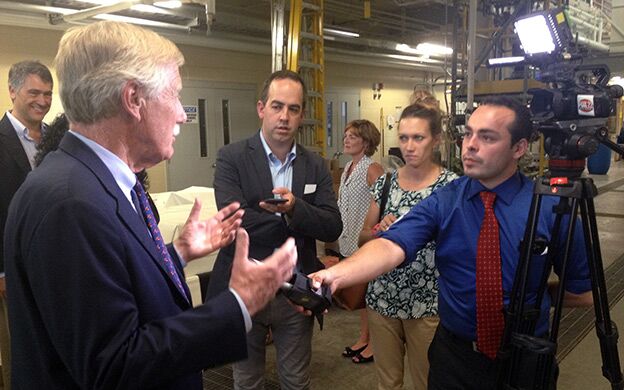Processing Your Payment
Please do not leave this page until complete. This can take a few moments.
- News
-
Editions
-
- Lists
-
Viewpoints
-
Our Events
-
Event Info
- Women's Leadership Forum 2025
- On the Road with Mainebiz in Bethel
- Health Care Forum 2025
- On The Road with Mainebiz in Greenville
- On The Road with Mainebiz in Waterville
- Small Business Forum 2025
- Outstanding Women in Business Reception 2025
- On The Road with Mainebiz in Bath
- 60 Ideas in 60 Minutes Portland 2025
- 40 Under 40 Awards Reception 2025
- On The Road with Mainebiz in Lewiston / Auburn
- 60 Ideas in 60 Minutes Bangor 2025
Award Honorees
- 2025 Business Leaders of the Year
- 2024 Women to Watch Honorees
- 2024 Business Leaders of the Year
- 2023 NextUp: 40 Under 40 Honorees
- 2023 Women to Watch Honorees
- 2023 Business Leaders of the Year
- 2022 NextUp: 40 Under 40 Honorees
- 2022 Women to Watch Honorees
- 2022 Business Leaders of the Year
-
-
Calendar
-
Biz Marketplace
- News
-
Editions
View Digital Editions
Biweekly Issues
- April 21, 2025 Edition
- April 7, 2025
- March 24, 2025
- March 10, 2025
- Feb. 24, 2025
- Feb. 10, 2025
- + More
Special Editions
- Lists
- Viewpoints
-
Our Events
Event Info
- View all Events
- Women's Leadership Forum 2025
- On the Road with Mainebiz in Bethel
- Health Care Forum 2025
- On The Road with Mainebiz in Greenville
- On The Road with Mainebiz in Waterville
- + More
Award Honorees
- 2025 Business Leaders of the Year
- 2024 Women to Watch Honorees
- 2024 Business Leaders of the Year
- 2023 NextUp: 40 Under 40 Honorees
- 2023 Women to Watch Honorees
- 2023 Business Leaders of the Year
- + More
- 2022 NextUp: 40 Under 40 Honorees
- 2022 Women to Watch Honorees
- 2022 Business Leaders of the Year
- Nomination Forms
- Calendar
- Biz Marketplace
Feds deliver $7.7 million to diversify Maine's economy
 Photo / James McCarthy
U.S. Sen. Angus King speaks to the press during an event at the University of Maine in Orono that announced the awarding of $7.7 million in federal grants to assist Maine's economy following the recent closure of five pulp and paper mills since 2011.
Photo / James McCarthy
U.S. Sen. Angus King speaks to the press during an event at the University of Maine in Orono that announced the awarding of $7.7 million in federal grants to assist Maine's economy following the recent closure of five pulp and paper mills since 2011.
The federal government is providing $7.7 million in federal grants to help diversify Maine’s economy in the wake of the closure of five pulp and paper mills since 2011.
In addition to that financial assistance, U.S. Deputy Assistant Secretary of Commerce for Economic Development Matt Erskine told stakeholders at Friday’s press event at the University of Maine in Orono that the Economic Development Administration will deploy a team of economic development experts to Maine later this month to help the state create a long-term strategy for retooling the state’s struggling forest products industry.
Erskine said the Economic Development Assessment Team will meet Aug. 17-19 with local and state leaders and industry partners “to engage in a comprehensive session of stakeholder meetings, to develop economic strategies and options, and identify prospects for economic development and growth and diversification.”
During the three-day EDAT visit, regional leaders and economic development experts will be joined by representatives of the U.S. departments of Treasury, Agriculture, Commerce, Labor, Transportation, and Energy; the Environmental Protection Agency, the Small Business Administration, and the Northern Border Regional Commission in a series of economic development sessions, tours and briefings.
In support of that effort EDA is investing $711,600 with the Maine Development Foundation, which will be matched by closed to $200,000 in matching funds from the foundation, to help MDF “support, coordinate and track the economic recovery efforts that result from the findings and recommendations made by EDAT that will be here in August.”
“This is a big deal,” said U.S. Sen. Angus King, who noted after the press conference that EDA has only deployed 30 such teams in its history, with the last one being in response to the 2010 British Petroleum oil spill in the Gulf of Mexico that devastated the coastal economies of Louisiana and the other Gulf states. “They’ll be going to paper mills, lumber mills, biobased manufacturers, the University of Maine. This is just the beginning. Nobody expects we’ll solve the problems of the pulp and paper and wood products industry here in Maine in three days. We’ll analyze the problems, assess where the opportunities might be and then develop a strategy for getting there.”
King said Maine’s congressional delegation worked closely together to persuade the EDA that deployment of its team of experts was warranted, given the closure of 10 Maine mills over the past eight years.
“We said, ‘Look, we’ve had what amounts to a slow-moving hurricane,” King said. “We saw what was happening to a bunch of our paper mills and said, ‘We’ve got to do something. We’ve got this toolkit in the federal assets, let’s take advantage of it.’”
Roadmap to grow Maine's biobased industries
In announcing $7.7 million of various federal grants, Erskine said EDA will invest $519,930 as part of a $856,549 project involving Biobased Maine, an industry trade association based in Portland, which is partnering with the University of Maine to develop a “road map” to advance biobased manufacturing in Maine.
The funding will be used to market Maine's biobased assets to investors in new technologies and processes and provide technical assistance to Maine forest products manufacturers and users in the implementation of new biobased technologies.
The EDA anticipates that the cost analysis, technology assessment and market research component of the project could place one or more mills into the production of cellulosic sugars, with 195 or more jobs created in Maine.
Charlotte Mace, executive director of Biobased Maine, described the grant announcement as a “milestone for the ‘plants to products’ strategy that can breathe new life into Maine’s forest economy.”
“This substantial federal grant award will advance biobased manufacturing, a strategy that uses new technology to convert renewable resources from forest, farm and sea into value-added biobased products,” she said. “Similar road maps in other states guide investors and help attract substantial new investment.”
Other grants
Other grant recipients named by Erskine as part of the $4.4 million in EDA funding announced Friday:
· C&L Aerospace in Bangor, which will receive $1.24 million to support the further expansion of its refurbishing facility for commercial turboprop and jet aircraft. As a result of this investment, C&L Aerospace expects to create at least 50 new jobs.
· Bangor Target Area Development Corp. in Orono, $345,000, to make interior upgrades within the Target Technology Center to create wet laboratory and supporting space to the Twin Rivers Paper Co. and the Cerahelix Corp. Twin Rivers operates one of Maine’s six remaining paper mills (located in Madawaska), which is successfully competing in the paper packaging market, and is relocating its research and development operation from Montreal, Canada to Orono, to be closer to the mill and have better access to the University of Maine’s Forest Bioproducts Research Institute, Erskine said. While Twin Rivers will only be on-shoring a few research jobs, the implications and potential impacts of this move are significant, including the retention of 500 paper mill jobs in Madawaska, the EDA stated in its announcement.
· Central Maine Community College in Auburn, almost $1.6 million, to expand its Precision Machining Technology laboratory by 8,600 square feet to accommodate increasing demand for skills training by enrolled students and businesses. The expanded facility will allow a 20% increase in student enrollment, which is critical to meeting the industry’s estimate of 900 high-skill, high-wage precision machining vacancies that will occur during the next five years.
Erskine also announced that the U.S. Department of Defense’s Defense Logistics Agency will invest $3.3 million to advance wood to jet fuel technology at the Technology Research Center of the Forest Bioproducts Research Institute at the University of Maine.
Read more
Federal team begins assessment of struggling forest products industry
Report: Maine loggers contribute $882M to state economy
Organic waste reuse company's Unity expansion touts job creation










Comments